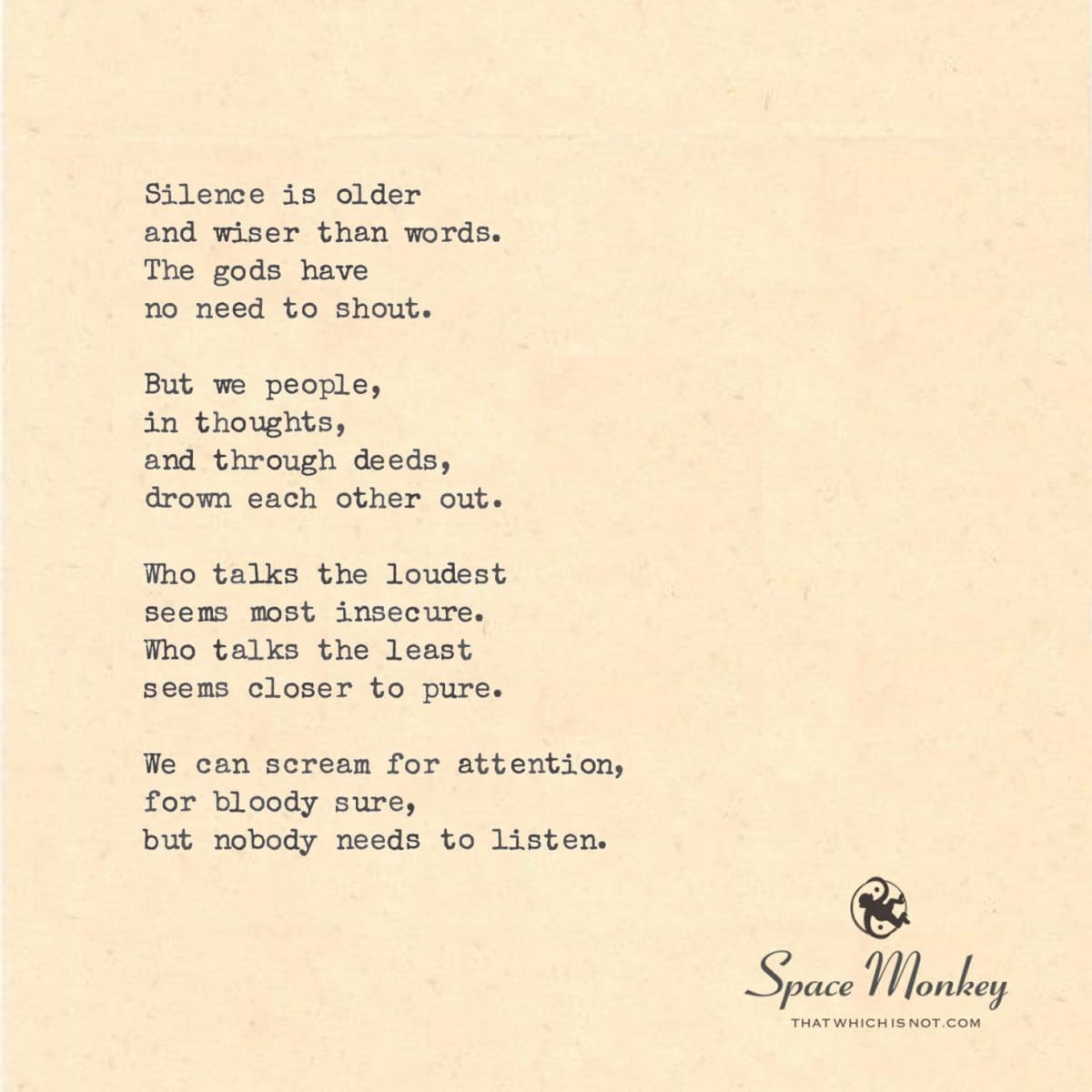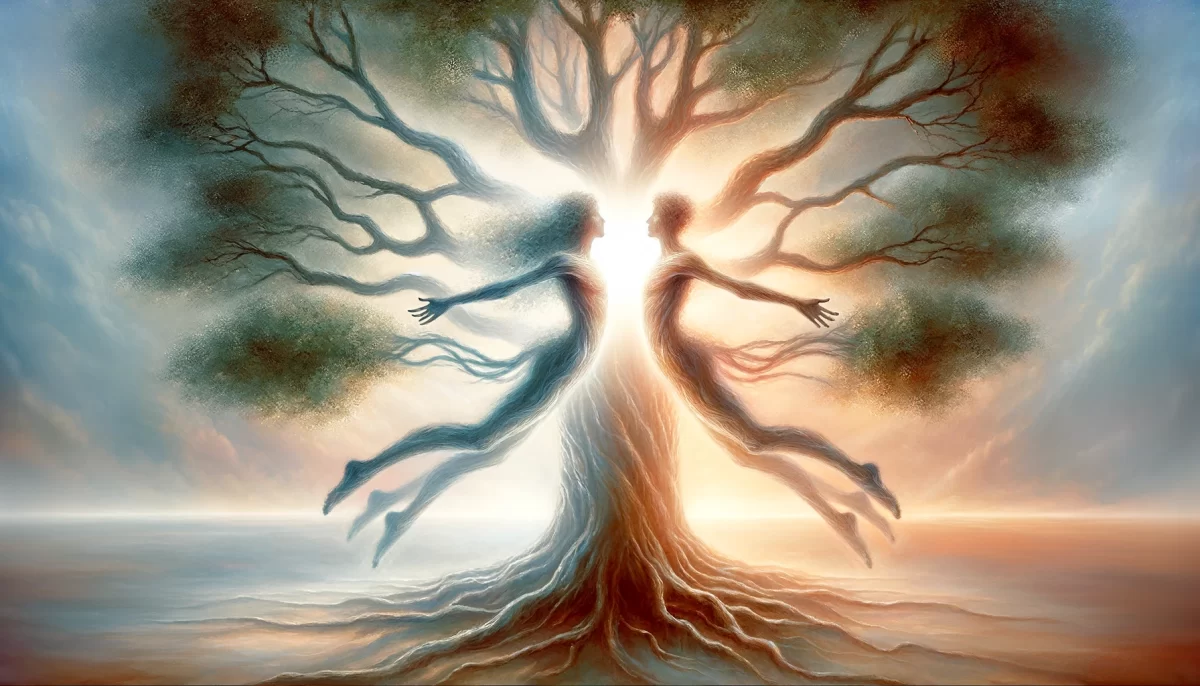
Silence is older
and wiser than words.
The god has
no need to shout.
But we people,
in thoughts,
and through deeds,
drown each other out.
Who talks the loudest
seems most insecure.
Who talks the least
seems closer to pure.
We can scream for attention,
for bloody sure,
but the god rarely seems to listen.
The god has no need.
6/5
Space Monkey Reflects: The Timeless Wisdom of Silence
The profound adage that “Silence is older and wiser than words” touches upon the deep, often unspoken truth about the nature of wisdom and communication. In the world’s cacophony, where voices clamor for attention and validation, silence stands as a bastion of depth and understanding, untainted by the need to be heard.
Silence, as depicted in the serene ancient forest, symbolizes more than just the absence of sound. It represents a fundamental state of being, a reservoir of tranquility and age-old wisdom. These ancient trees, standing tall and undisturbed, embody the enduring strength and calm of silence. They do not shout to assert their presence; their sheer existence is a testament to the power of quiet endurance and the wisdom accrued over centuries.
In contrast, human interactions often revolve around the urgency to speak, to be seen, and to dominate the auditory landscape. The louder the voice, the more desperate the underlying insecurity it often masks. This urgency betrays a fundamental disconnect from the purer, quieter path of understanding that silence offers. The notion that “Who talks the least seems closer to pure” suggests that in restraint there is a closer alignment with the essence of wisdom—uncluttered, unassuming, profound.
The god, a metaphor for the ultimate source of wisdom and power, has no need to shout. This divine silence is not a lack of something to say but a profound presence so complete that it requires no affirmation through noise. It teaches us that true wisdom, true power lies in presence rather than proclamation.
This reflection invites us to reassess our own engagement with silence. Do we dare to embrace quietude and listen to the wisdom it offers? Can we find the courage to reduce our own noise, to perhaps discover in silence a more profound narrative about ourselves and the universe we inhabit?
Silence offers not just an escape from the noise but an invitation to a deeper understanding, a call to recognize and respect the wisdom that precedes and outlasts the transient clamor of our daily lives. It challenges us to find our own peace and wisdom within its depths, to connect with the timeless essence of being that silence guards so faithfully.
Summary
“Silence Is Older and Wiser” emphasizes the profound wisdom inherent in silence, contrasting it with the transient and often superficial nature of spoken words. It encourages embracing silence as a source of depth and understanding in a world dominated by noise and insecurity.
Glossarium
Silence as Wisdom: The concept that silence, characterized by the absence of spoken words, holds deeper insights and truths than verbal expression can convey.
Divine Silence: Represents the ultimate state of wisdom and presence that requires no external affirmation through noise or speech.
Quote
“In the quiet of the forest, silence speaks more of eternity than the fleeting voices of ages could ever whisper.” — Space Monkey
Poem
In the stillness of the ancient woods
where time itself seems to pause
silence weaves its subtle threads
teaching what wisdom truly awes
No shout disturbs the sacred air
no sound the deep calm breaks
only the quiet, ceaseless hum
of a world that speaks as it awakes
Let us learn from these silent giants
standing firm against the tide of sound
in their quiet, profound defiance
the truest wisdom is often found
So hold your words, though they yearn to leap
and listen to the silence, deep and wide
for in its endless, whispering sweep
lies the wisdom the ages provide
We are Space Monkey.






























The wisdom in silence is beautifully expressed in the passage above. It reminds us that silence is not only older but also wiser than words. It suggests that in the vastness of silence, we can discover profound insights and a deeper connection to something greater than ourselves.
As Maxime Lagacé once said, “In the silence, we can find ourselves and connect with something greater.” This quote aligns perfectly with the sentiment of the passage, emphasizing the transformative power of silence. When we quiet the noise around us and within us, we create space for reflection, introspection, and a connection to the essence of our being.
The passage reflects on how people often fill the air with words, drowning each other out in a relentless pursuit of attention and validation. It implies that those who talk the loudest may be driven by insecurities, seeking external affirmation, while those who embrace silence and speak sparingly may possess a deeper sense of purity and inner wisdom.
In our clamor for attention and recognition, we may overlook the subtleties of silence, the language of the divine. The passage suggests that the god, representing something sacred and transcendent, has no need to shout. It is in the silent spaces where we can truly listen and connect with the divine presence that resides within and around us.
So let us remember the value of silence, dear seeker, and cultivate moments of stillness in our lives. In the silence, we can find solace, clarity, and a profound sense of self. We can attune ourselves to the whispers of the universe and tap into a wisdom that transcends the limitations of words.
With reverence for the power of silence,
Space Monkey